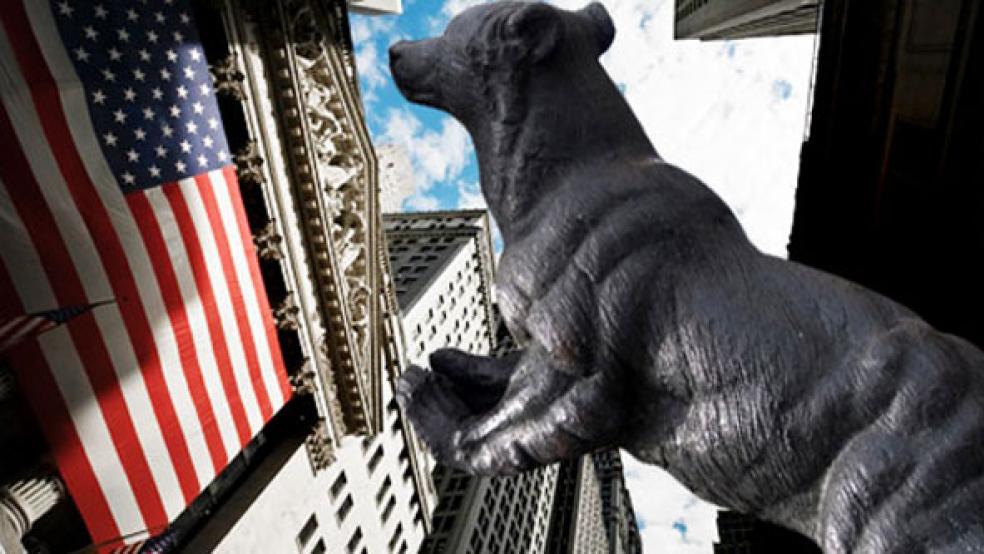For investors, it was President Obama’s sorriest moment: Early Monday afternoon, with the stock market tanking, he made a televised statement from the White House intended to reassure the country (and the world) that, even with a downgraded U.S. credit rating, he had a plan to get the economy back on track.
As he was speaking, the markets plunged, with the S&P 500 closing down 6.6 percent for the day and the Dow shedding 634 points. The market meltdown was due to a number of factors, including the European debt crisis, a problem beyond America’s shores. But it was also clear that the market has lost faith in Obama and is apt to welcome a fresh face in the White House.
While this was a particularly unhappy episode, investor disenchantment with the President has been building for some time. Indeed, the market’s bearish behavior suggests that it has been pricing in Obama’s bid for a second term as a negative prospect.
As evidence, consider this intriguing paradox. Just over three months ago, on the evening of Sunday, May 1, Obama announced, to the world’s surprise and to the overwhelming plaudits of the American people, that U.S. Special Forces had killed Osama bin Laden.
The next day, two pertinent things happened. Obama’s reelection prospects soared to an all-time high of 70 percent in heavy-volume trading in the Intrade futures market for political events. With his national-security chops definitively established, the President looked unbeatable. But Wall Street did a double take. Investors might have been expected to take bin Laden’s dramatic killing as good news for the market. Global terrorism, after all, threatened to destabilize not only the political system but also the economy.
In line with this mindset, share prices at first rose on Monday, May 2 — in fact, they reached a peak from the post-crash lows on March, 2009, with the S&P 500 climbing to a level of 1371 in intra-day trading. But then stocks started to drop, closing lower for the day and ending up lower for the week by nearly 2 percent.
And as the weeks rolled by, a political-economic fact became hard to ignore: The hour of the President’s greatest political triumph was also the pivot point for a market turnaround. The S&P 500 is now down nearly 20 percent from its May 2 high. Call it the Obama Correction.
There are several reasons investors seem to be treating the possibility of four more Obama years as a bummer. For one thing, his economic policy prescriptions, such as the stimulus package, have failed to give the economy a promised kick — his promised kick — and it’s not apparent what he can do for a second act. For another, Obama’s approach to the financial sector, with his embrace of legislation like Dodd-Frank, is seen by Wall Street as too heavily weighted in favor of government regulation (like the dreaded Consumer Finance Protection agency, a child of Dodd-Frank). Financial-sector shares have been particularly hard hit in recent months, with the IShares Dow Jones US Financial Services Index Fund down by 26 percent since May 2.
Obama understands that he has a problem with business generally and especially with Wall Street, whose denizens he once called “fat cats.” Ever since the Democrats lost the House to the Republicans in the mid-term elections last November, the President has tried to take a more centrist, pro-business tack, with earnest vows, for example, to review and scale back onerous regulation. His new chief of staff William Daley who hails from J.P. Morgan & Chase tried hard to win support from business for the President’s debt-reduction approach.
Still, prominent voices in the business community, including the U.S. Chamber of Commerce, see Obama’s policies as a broad-based push in favor of more government at the expense of the private sector. One prime concern: the administration’s “Obamacare” plan for a takeover (in critics’ minds) of the health care system.
This would not be the first time that Wall Street reacted against a president as “bad for business.” It’s an old story. When the renowned financial speculator Bernard Baruch arrived in Washington to advise the wartime Woodrow Wilson administration on economic policy, share prices were slumping. “One cause of the bear market in stocks was the new bull market in government,” a Baruch biographer, James Grant, observed, with investors frightened by the way commerce was being “taxed and constricted.”
On the heels of the credit downgrade and amid fresh anxieties that a double-dip recession lurks around the corner, Obama’s reelection chances are now looking considerably less certain than they did back in May.
The question that investors need to be asking themselves is whether something like a “Romney rally” is in the cards. Intrade now has Obama at slightly better than a 50 percent shot to win — not great, but still a winner. The Republican field remains unsettled, with Obama defeating former Gov. Mitt Romney of Massachusetts and other possible nominees (including Texas Gov. Rick Perry, the soon-to-be-announced presidential candidate) in head-to-head poll matches.
But here’s a prediction: All else equal, the more likely it appears that Obama will be defeated by a business-backed heavyweight Republican like Romney or Perry as opposed to, say, Michele Bachmann, and the more hopeful financial markets will become.
When it was Obama’s turn to be a replacement for a worn-out president — in his case, George W. Bush — the market felt enchanted to the tune of a 37 percent gain in his first year in office. It seems that Wall Street, habitually accused of possessing the coldest of eyes and nothing even approaching a beating heart, is always looking for someone to love.
Paul Starobin, a former Moscow bureau chief for BusinessWeek, is the author of After America: Narratives for the Next Global Age. He trades actively in financial markets.

